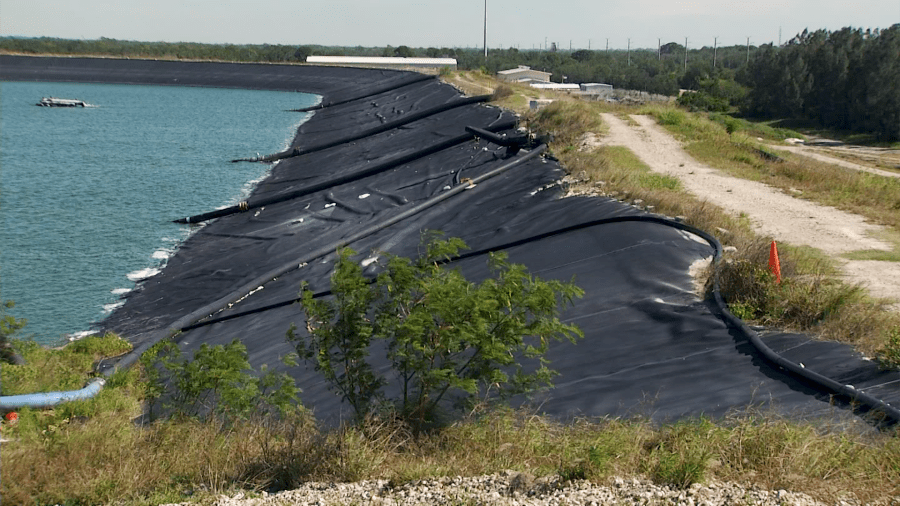MANATEE COUNTY, Fla. (WFLA) — The “final chapter” of Piney Point is well underway, with one of the long-troubled phosphate plant’s four retainment stacks capped and the taxpayer-funded fix is now approaching $100 million.
Hurricanes like Idalia are often a concern for the shuttered facility, bringing rain that could cause an overflow or a breach and wind that could launch projectiles into the liners that hold the remaining toxic water.
Idalia caused only “minor road erosion,” according to court-appointed receiver Herb Donica. Donica happened to be out of state when the storm hit.
“Every hour, I watched local weather channels. I checked my home surveillance cameras,” Donica said. “The biggest issue is having the crew go all over the property looking for things that could take flight and become missiles. If a piece of metal went up in the air and came back down, it’s like a knife.”

Donica credited the work of the facility crews with securing potential “missiles” and said the deep well brought the water levels down significantly before the storm.
“We could’ve taken on five feet. We got less than three inches,” Donica said. “That will be disposed of pretty quickly by the deep injection well.”
Earlier this year, the well started injecting treated stack water below what we drink, more than 3,000 feet into the ground.
Donica acknowledged he was not always a fan of the deep well process, but after he was told to finally cap Piney Point, he realized it was the best option.
“I trust the science of it,” Donica said. “We’re testing the water before, during, and after. I don’t think there’s anything else that can be done to make it safer. We’re in the best position we’ve been in in 22 years.”
The alleged mismanagement of Piney Point’s waste remains in litigation in a federal lawsuit filed in 2021 by environmental groups Center for Biological Diversity, Tampa Bay Waterkeeper, Our Children’s Earth Foundation, and Manasota-88.
A mediation notice was filed Friday, and a conference is scheduled for next month.
Manasota-88 founder Glenn Compton has said he does not trust the deep well science or the process of shutting down phosphate facilities.
“There’s really no economically feasible way to close one, and ultimately, the taxpayers and the environment pay the cost for having these operations in the state of Florida,” Compton said.
He also pointed out the stacks were built and engineered more than 50 years ago.
“There is still the very real risk of a stack failure and the catastrophic release of hundreds of millions of gallons of toxic water,” Compton said.

Donica said just over $62 million has been spent on closing Piney Point since October of 2021 when he took over and last month.
Since the breach prompted DEP to relieve pressure on “New Gyp Stack South” by sending about 215 million gallons of water into the bay, “Old Gyp Stack South” has been all but capped.
Donica said that part of the project should be completed in a matter of days, and the next one to be drained and capped will be the stack that was breached.
“I’m going over the contracts for that now,” Donica said. “700,000 cubic yards of sediment has to be removed.”
The closing of all four stacks could be completed in just over a year, by the beginning of 2025, according to Donica.
“Originally, we were shooting for December 2024,” Donica said. “But again, you can’t help the supply chain problems. So, I think early 2025 is where we’re looking right now.”
That will not be the last time taxpayers hear about Piney Point or pay for it. The site must be monitored for 50 years after it is closed.







